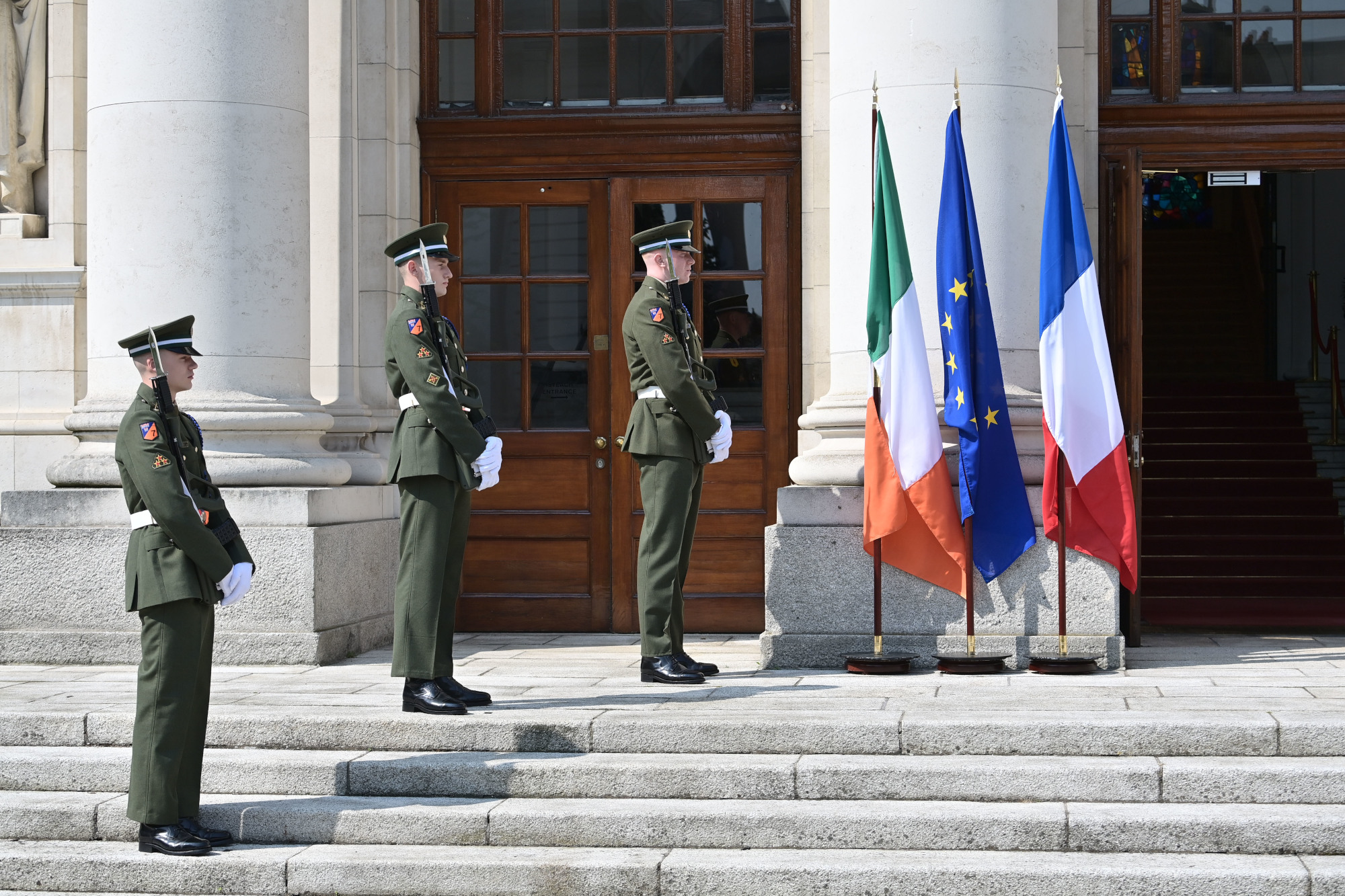As the war of words between Donald Trump and the EU continues to escalate, European countries have become increasingly concerned about their military reliance on the United States. As a result, the need to increase defence spending has become a major issue.
Germany has abandoned its ‘debt lock’ as it seeks to raise more funds for its military, while Macron has repeatedly spoken of the need to gain more ‘strategic autonomy’ away from America. Now the debate has even spread to Ireland, the country on the furthest western edge of the EU.
Traditionally, Ireland has prided itself on its neutrality or ‘military non-alignment’, while also enjoying a long-standing record of serving with UN peacekeeping forces, most notably in the Congo and southern Lebanon. But the luxury of formal military neutrality has come under increasing scrutiny.
Currently, the Irish spend 0.2 per cent of their GDP on defence. This is the lowest in the EU, where the average is 1.9 per cent – and this average will soon to be increased.
This shortfall has been recognised by the Irish government. Simon Harris confirmed earlier this year that the defence budget will increase to €1.5 billion by 2028. According to the Tanaiste this would bring the country to what’s known as ‘Level of Ambition 2’. But he insisted that, ‘reaching Level of Ambition 3 is where we need to get to in the years ahead.’ This will allow Ireland to develop what its Commission on the Defence Forces describes as ‘full spectrum defence capabilities to protect Ireland and its people to an extent comparable to similar sized countries in Europe’
That there needs to be a massive increase in spending is not in any doubt, and this has been the situation for years. The Irish army is woefully undermanned, underfunded and demoralised, the Irish Air Corps is virtually non-existent and relies on the RAF to patrol Irish skies while the navy in February only had one functioning vessel operating in Irish waters.
Crucially, at a time of increased Russian incursions into Irish territorial waters, there is no radar capability to monitor Russian activity off the west coast. Given the number of transatlantic cables in the region, this is a headache not just for the Irish but also for the UK and the EU.
That farcical situation was brought home in January 2022 when the Russian embassy in Dublin informed the Irish government that their navy planned to conduct a five-day exercise in waters in the Irish economic zone. In the end, the Russian navy left the area because, in a rather wonderful example of Irish defiance, local fishing boats refused to leave the area, forcing the Russians to withdraw. A country which is forced to rely on the grit of its fishermen, rather than its navy, to see off a foreign threat can’t claim to be able to defend itself.
But there remains a powerful resistance in Ireland against anything which might compromise its neutrality.
The main bone of contention remains Ireland’s ‘Triple Lock’ which requires a United Nations mandate, as well as cabinet and Dail approval to deploy more than 12 Irish soldiers in any one operation.
The cabinet has already approved plans to scrap the Triple Lock. They claim that requiring a UN mandate for deployment means the Russians can simply use their position on the Security Council to veto any Irish operations it doesn’t approve of, such as contributing to an EU taskforce in Ukraine.
On the other hand, supporters of the Triple Lock say the idea of a Russian veto is a deliberate misunderstanding of UN protocols and any foreign excursion would merely require General Assembly approval.
But running far deeper than the nuances of United Nations procedural rules is a fascinating divide between how Irish people see their place in a rapidly changing Europe.
The government remains convinced Ireland needs to stand alongside its European partners.
As former chief of staff of Defence Forces, Vice Admiral Mark Mellett, recently pointed out: ‘neutrality as a statement in a globalised world is a myth… I don’t believe we are a neutral state…You have to be able to work with others to deliver defence capabilities in today’s world.’
To those on the other side of the debate, such sentiments are a precursor to Ireland signing up for a European army and that is something that many Irish people, particularly those on the left, are opposed to on a cellular level.
That sentiment was best personified by Michael D. Higgins, who caused consternation in January when he condemned increased defence spending as ‘appalling’ and said that was is a ‘state of mind’ while expressing his horror that increased spending may come at the expense of investing in education, social protection and health.
Ireland’s ‘Triple Lock’ requires a UN mandate, as well as cabinet and Dail approval, to deploy more than 12 soldiers in any one operation
These remarks drew sharp rebuke from countries on the periphery of the EU. Former Estonian president Toomas Hendrik was scathing, saying: ‘Do these people have any sense of self-awareness, their privileged geography or the appropriateness of even commenting as the beneficiary of implicit Nato security?’
While the views of Higgins may not have gone been well received in Tallin and other Baltic capitals, they are firmly echoed by the left wing parties such as Labour, People Before profit and the Social Democrats, who recently demanded a plebiscite on the removal of the Triple Lock.
Currently the debate seems to be framed around ridiculously simplistic arguments from both sides.
The dove mantra is that they don’t want to send their children to die in foreign wars (no argument in Ireland, it seems, can be conducted without somebody thinking about the children). The more interventionist wing, which tends to be represented by stridently pro-EU figures, claim that Ireland can’t expect to be seen as a properly European country if it is not prepared share the military burden with its neighbours.
With the Dail currently hamstrung by a farcical argument over the amount of time for speaking rights for the opposition, there has yet to be a proper and thorough parliamentary debate. But it’s an issue that needs urgent attention. In the meantime, we can expect plenty of hysteria and hyperbole – from both sides.








Comments